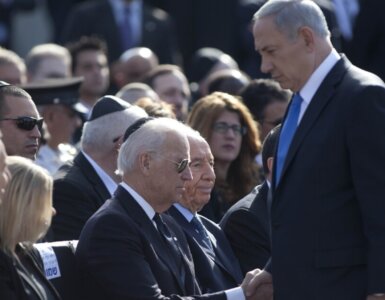shows and seminars on the Middle East. She trades in “the Islamic
threat” — her particular mission has been to advance the millennial
thesis that militant Islam is a danger to the West. The search for a
post-Soviet foreign devil has come to rest, as it did beginning in the
eighth century for European Christendom, on Islam, a religion whose
physical proximity and unstilled challenge to the West seem as
diabolical and violent now as they did then.
Islamic countries today are too poverty-stricken, tyrannical and
hopelessly inept militarily as well as scientifically to be much of a
threat to anyone except their own citizens; and never mind that the
most powerful of them — like Saudi Arabia, Egypt, Jordan and Pa kistan
— are totally within the U.S. orbit. What matters to “experts” like
Miller, Samuel Huntington, Martin Kramer, Bernard Lewis, Daniel Pipes,
Steven Emerson and Barry Rubin, plus a whole battery of Israeli
academics, is to make sure that the “threat” is kept before our eyes,
the better to excoriate Islam for terror, despotism and violence, while
assuring themselves profitable consultancies, frequent TV appearances
and book contracts. The Islamic threat is made to seem
disproportionately fearsome, lending support to the thesis (which is an
interesting parallel to anti-Semitic paranoia) that there is a
worldwide conspiracy behind every explosion.
take state power. Iran is a possible exception, but neither Sudan,
already an Islamic state, nor Algeria, riven by the contest between
Islamic groups and a brutal soldiery, has done any thing but make
itself poorer and more marginal on the world stage. Lurking beneath the
discourse of Islamic peril in the West is, however, some measure of
truth, which is that appeals to Islam among Muslims have fueled
resistance (in the style of what Eri c Hobsbawm has called primitive,
pre-industrial rebellion) to the Pax Americana-Israelica throughout the
Middle East. Yet neither Hezbollah nor Hamas has presented a serious
obstacle to the ongoing steamroller of the anything-but-peace process.
Most Arab Muslims today are too discouraged and humiliated, and also
too anesthetized by uncertainty and their incompetent and crude
dictatorships, to support anything like a vast Islamic campaign against
the West.
the regimes, supporting martial law and other extralegal measures
against “extremists.” So why, then, the accents of alarm and fear in
most discussions of Islam? Of course there have been , about the man
whom Rodinson says was a combination o f Charlemagne and Jesus Christ;
for whereas Rodinson understands what that means, Miller tells us
(irrelevantly) that she is not convinced. For her, Mohammed is the
begetter of an anti-Jewish religion, one laced with violence and
paranoia. She does not di rectly quote one Muslim source on Mohammed;
just imagine a book published in the United States on Jesus or Moses
that makes no use of a single Christian or Judaic authority.
endless interviews with what seems to be a slew of pathetic,
unconvincing, self-serving scoundrels and their occasional critics.
Once past her little histories we are adrift in boring, unst ructured
meanderings.
“And Syrians, mindful of their country’s chaotic history” (of what
country on earth is this not also true?) “found the prospect of a
return to anarchy or yet another prolonge d, bloody power struggle — ”
(is this uniquely true of Syria as a postcolonial state, or is it true
of a hundred others in Asia, Africa, Latin America?) “and perhaps even
the triumph of militant Islam in the most secular” (with what
thermometer did she g et that reading?) “of all Arab states —
alarming.” Leave aside the abominable diction and jaw-shattering jargon
of the writing. What you have is not an idea at all but a series of
clichés mixed with unverifiable assertions that reflect the
“though t” of “Syrians” much less than they do Miller’s.
which she uses to convince her reader that she really knows the people
and consequently what she is talking about. I counted 247 uses of the
phrase before I stopped about halfway throug h the book. This technique
produces extraordinary distortions in the form of long digressions that
testify to an Islamic mindset, even as they obscure or ignore more or
at least equally relevant material like local politics, the functioning
of secular ins titutions and the active intellectual contest taking
place between Islamists and nationalist opponents. She seems never to
have heard of Arkoun, or Jabri, or Tarabishi, or Adonis, or Hanafi or
Djeit, whose theses are hotly debated all over the Islamic wor ld.
Israel (mistitled, since it is all about Palestine), where she ignores
the changes caused by the intifada and the prolonged effect of the
three-decade Israeli occupation, and c onveys no sense of the
abominations wrought on the lives of ordinary Palestinians by the Oslo
accords and Yasir Arafat’s one-man rule. Although Miller is obsessed
with Hamas, she is clearly unable to connect it with the sorry state of
affairs in territori es run brutally by Israel for all these years. She
never mentions, for instance, that the only Palestinian university not
established with Palestinian funds is Gaza’s Islamic (Hamas)
University, started by Israel to undermine the P.L.O. during the inti
fada. She records Mohammed’s depredations against the Jews but has
little to say about Israeli beliefs, statements and laws against
“non-Jews,” often rabbinically sanctioned practices of deportation,
killing, house demolition, land confiscation, annex ation and what Sara
Roy has called systematic economic de-development. If in her
breathlessly excitable way Miller sprinkles around a few of these
facts, nowhere does she accord them the weight and influence as causes
of Islamist passion that they undoubt edly have.
Christian, or Muslim Sunni, Muslim Shiite, etc. Even so, she is not
always accurate, managing to produce some howlers. She speaks of Hisham
Sharabi as a friend but misidentifies him as a Christian; he is Sunni
Muslim. Badr el Haj is described as Muslim whereas he is Maronite
Christian. These lapses wouldn’t be so bad were she not bent on
revealing her intimacy with so many people. And then there is her bad
faith in not identifying her ow n religious background or political
predilections. Are we meant to assume that her religion (which I don’t
think is Islam or Hinduism) is irrelevant?
people and power and certain events. She is “grief-stricken” when King
Hussein of Jordan is diagnosed with cancer, although she scarcely seems
to mind that he runs a police state whose man y victims have been
tortured, unfairly imprisoned, done away with. One realizes of course
that what counts here is her hobnobbing with the little King, but some
accurate sense of the “modern” kingdom he rules would have been in
order. Her eyes “filled wit h tears — of rage” as she espies evidence
of desecration of a Lebanese Christian mosaic, but she doesn’t bother
to mention other desecrations in Israel — for example, of Muslim
graveyards — and hundreds of exterminated villages in Syria, Lebanon,
Pales tine.
following, in which she imputes thoughts and wishes to a middle-class
Syrian woman whose daughter has just become an Islamist:
yearned for: no grand wedding party and traditional white dress with
diamond tiara for her daughter, no silver-framed photos of the happy
wedding couple in tuxedo and bridal g own on the coffee table and
fireplace mantel, no belly dancers wriggling on a stage and champagne
that flowed till dawn. Perhaps Nadine’s friends, too, had daughters or
sons who had rejected them, who secretly despised them for the
compromises they had ma de to win the favor of Assad’s cruel and
soulless regime. For if the daughter of such pillars of the Damascene
bourgeoisie could succumb to the power of Islam, who was immune?”
privacy she has invaded.
interesting question about Miller’s book is why she wrote it at all.
Certainly not out of affection. Consider, for instance, that she admits
she fears and dislikes Lebanon, hates Syria, laughs at Libya, dismisses
Sudan, feels sorry for and a little alarmed by Egypt and is repulsed by
Saudi Arabia. She is relentlessly concerned only with the dangers of
organized Islamic militancy, which I would hazard a guess accounts for
clares dead numerous times in the book; a supporter of U.S. policy; and
a committed foe of any Palestinian nationalism that doesn’t conform to
the bantustans being set up according to the Oslo accords. Miller, in
short, is a shallow, opinionated journalist whose gigantic book is too
long for what it ends up saying, and far too short on reflection,
considered analysis, structure and facts. Poor Musli ms and Arabs who
may have trusted her; they should have known better than to mistake an
insinuated guest for a friend.
Palestine and the Middle East Peace Process” (Vintage).
Electronic redistribution for nonprofit purposes is permitted, provided
this notice is attached in its entirety. Unauthorized, for-profit
redistribution is prohibited. For further information regarding
reprinting and syndication, please call The Nation at (212) 242-8400,
ext. 226 or send e-mail to Max Block





Tambahkan komentar